Welcome, dog lovers, to an exciting journey into the world of small dog breeds with long legs! If you’re captivated by the charm of these canines, then you’ve come to the right place. In this blog post, we will dive into the best small dog breeds with long legs, that add an extra touch of elegance and agility to their already irresistible nature.
These small dogs defy expectations and steal hearts with their elongated stature and graceful movements. From energetic to lovable herders, these breeds may be small in size, but they certainly make a big impact.
So, why are small dogs with long legs so special? What factors should you consider when choosing one as your furry companion? How can you ensure their training, exercise, and care needs are met? Get ready for an adventure filled with information, and tips.
Throughout this blog post, we will explore the factors to consider when selecting a small dog breed with long legs. We’ll delve into the training and exercise requirements that will keep these agile canines happy and healthy.
Plus, we’ll share valuable tips for their care, grooming, and overall well-being. By the end of this journey, you’ll have all the knowledge you need to make an informed decision and provide the best possible care for your small dog with long legs.
Factors to Consider When Choosing a Small Dog Breed with Long Legs
When selecting a small dog breed with long legs, it’s essential to consider various factors that align with your lifestyle and preferences. Here are some key aspects to keep in mind:
1. Size and Weight
While these breeds are small, their body sizes and weights can vary. Consider the size that fits your living arrangements, whether it’s an apartment or a house with a yard.
2. Temperament and Personality
Each breed has its distinct temperament and personality traits. Research and understand the breed’s typical characteristics to ensure compatibility with your lifestyle. Are you looking for an active and playful companion or a calm and laid-back lap dog?
3. Exercise and Activity Level
Although they have long legs, not all small dog breeds with long legs require extensive exercise. Evaluate your own activity level and choose a breed that aligns with it. Some breeds may require more physical and mental stimulation than others to prevent restlessness or destructive behavior.
4. Grooming Needs
Consider the grooming requirements of the breed you’re interested in. Long-haired breeds may need regular brushing to prevent matting, while short-haired breeds may have minimal grooming needs. Determine if you’re willing to invest the time and effort into maintaining their coats.
5. Training and Socialization
Training and socialization are crucial for all dog breeds, and small dogs with long legs are no exception. Some breeds may be more independent, requiring patient and consistent training methods. Socialization is essential to ensure they get along well with other pets, children, and strangers.
Training and Exercise Requirements for Small Dogs with Long Legs
Training and exercise are vital for the physical and mental well-being of small dogs with long legs. Here are some key considerations:
Early Socialization
Start socializing your small dog from a young age to expose them to various environments, people, and animals. This helps develop their confidence and ensures they grow up to be well-rounded companions.
Positive Reinforcement Training
Use positive reinforcement methods such as treats, praise, and rewards to train your dog. Small dogs with long legs are intelligent and eager to please, making them receptive to positive training techniques.
Daily Exercise
Engage your dog in daily exercise to keep them physically and mentally stimulated. This can include walks, playtime, interactive toys, and even dog sports like agility.
Mental Stimulation
Incorporate mental stimulation into your dog’s routine through puzzle toys, obedience training, or interactive games. Mental exercise is as important as physical exercise for these intelligent breeds.
10 Best Small Dog Breeds With Long Legs: Finding the Perfect Fit for Your Lifestyle
10. Cocker Spaniel
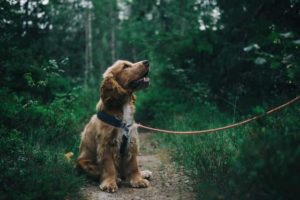
The Cocker Spaniel is a small breed with an elegant presence. Although they are known for their beautiful coat, they also possess longer legs that contribute to their athleticism and agility. Cocker Spaniels are excelling in various activities such as hunting, obedience, and agility.
Temperament and Personality
Cocker Spaniels are known for their friendly and affectionate nature. They are intelligent and eager to please, making them relatively easy to train. Their happy and outgoing personalities make them a joy to be around.
Care and Exercise Needs
Cocker Spaniels require regular exercise to keep them physically and mentally stimulated. Daily walks, playtime, and opportunities for off-leash activities in a secure area are important for their well-being.
Their beautiful coats require regular grooming to prevent matting and keep them looking their best. Regular ear cleaning is essential to prevent ear infections due to their long, droopy ears.
9. Basset Hound
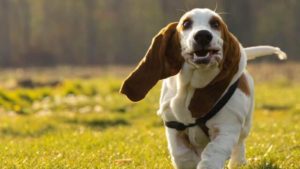
The Basset Hound is a small breed with a distinctive appearance characterized by its long, droopy ears and low-set, elongated body. While their legs may be relatively short, they possess a remarkable sense of smell and an ability to track scents with incredible accuracy. Basset Hounds are known for their calm and friendly nature, making them wonderful companions for families and individuals alike.
Temperament and Personality
Basset Hounds have a laid-back and easygoing temperament. They are known for their sweet and gentle nature, making them excellent companions, especially for families with children. Bassets are typically sociable with other dogs and enjoy the company of their human family members.
Care and Exercise Needs
Despite their short legs, Basset Hounds still require regular exercise to maintain a healthy weight and prevent boredom. Daily walks and playtime in a secure area are essential to keep them physically and mentally stimulated.
8. Boston Terrier
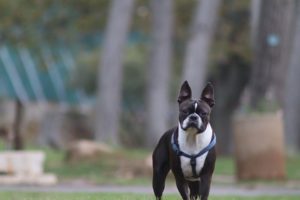
The Boston Terrier is a small muscular breed with a friendly and lively personality. Boston Terriers are known for their charming nature.
Temperament and Personality
Boston Terriers are friendly, affectionate, and sociable dogs. They have a sense of humor that can bring joy to their families. These little breeds thrive on human companionship and enjoy being part of family activities. They get along well with children and other pets, making them excellent family pets.
Care and Exercise Needs
While Boston Terriers have moderate exercise needs, they still require regular physical activity to maintain a healthy weight. Daily walks, play sessions, and mental stimulation through training and puzzle toys will keep them happy and content. Grooming-wise, their short coats are easy to maintain with regular brushing to minimize shedding.
7. Shetland Sheepdog

The Shetland Sheepdog, often referred to as the Sheltie is a small herding breed with a striking resemblance to its larger cousin, the Rough Collie. They are not only beautiful but also highly intelligent and devoted to their families.
Temperament and Personality
Shetland Sheepdogs are known for their intelligence, loyalty, and eagerness to please. They are highly trainable and excel in obedience and agility competitions. Shelties are gentle and affectionate with their families, including children and other pets. Their herding instincts may lead them to chase and nip at moving objects, so early training is important to ensure appropriate behavior.
Care and Exercise Needs
These active dogs require regular exercise to keep them physically and mentally stimulated. Daily walks, playtime, and engaging activities will help channel their energy. Shetland Sheepdogs have a dense double coat that requires regular brushing to prevent matting.
6. Pembroke Welsh Corgi
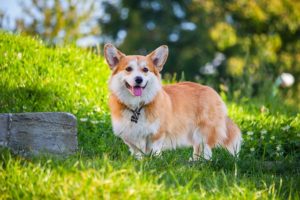
The Pembroke Welsh Corgi may be small in stature. These adorable dogs with their distinct short legs and elongated bodies possess surprising agility, allowing them to navigate obstacles with ease. Corgis are known for their playful nature and their ability to charm everyone they meet.
Temperament and Personality
Pembroke Welsh Corgis are intelligent and affectionate companions. Corgis are also known for their big personalities and their love for their families. Their loyal and friendly nature makes them wonderful additions to any household.
Care and Exercise Needs
While Corgis may have shorter legs, they still require regular exercise to keep them mentally and physically stimulated. Daily walks, playtime, and interactive toys can help meet their exercise needs. It’s important to monitor their weight. Grooming-wise, they have a dense double coat that requires regular brushing to keep them in good condition.
5. Whippet
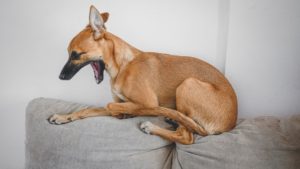
The Whippet is a small sighthound with a deep chest, slender body, and long legs. While they possess impressive speed and agility, Whippets are equally content curling up on the couch with their favorite humans. Their gentle and affectionate nature makes them excellent companions for families of all sizes.
Temperament and Personality
Whippets are known for their calm and friendly dispositions. Despite their love for sprinting, they are generally content with regular exercise and plenty of quality time with their loved ones.
Care and Exercise Needs
Despite their athletic abilities, Whippets are moderate in their exercise needs compared to some other sighthound breeds. Regular leash walks, occasional sprints in a safe area, and mentally stimulating activities will keep them happy and healthy.
4. Basenji
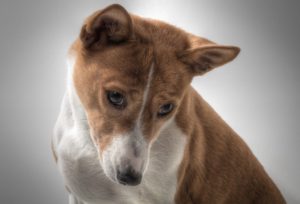
The Basenji is a unique small breed known for its elegant and graceful presence. Originating from Central Africa, this ancient breed possesses long, slim legs that contribute to its impressive agility.
Temperament and Personality
Basenjis are intelligent and independent dogs. They are highly curious and enjoy exploring their surroundings. Basenjis have a reputation for being clean and grooming themselves similar to cats. While they are affectionate with their families, they can be reserved with strangers and may require careful socialization.
Care and Exercise Needs
Despite their small size, Basenjis are active dogs that require regular exercise. Daily walks, playtime, and opportunities to stretch their legs in a secure area are essential for their physical and mental well-being. Their short, fine coats require minimal grooming, making them relatively low-maintenance in the grooming department.
3. Jack Russell Terrier
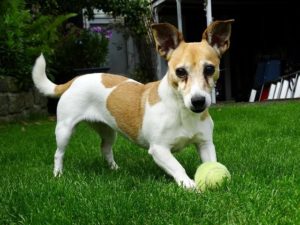
Jack Russell Terriers require an active lifestyle and plenty of mental stimulation to keep them content.
Temperament and Personality
Jack Russell Terriers are highly intelligent and independent thinkers. They possess a bold and curious nature that requires consistent training and mental challenges to prevent boredom and destructive behavior. With proper socialization, they can get along well with other dogs and cats.
Care and Exercise Needs
This breed demands an active lifestyle to meet its exercise needs. Daily walks, vigorous play sessions, and interactive toys can help channel their abundant energy. Jack Russell Terriers have short, smooth coats that are relatively easy to maintain, requiring occasional brushing to keep them looking tidy.
2. Dachshund
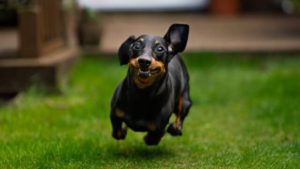
The Dachshund, with its long body and charming personality, is a breed that needs no introduction. Often recognized for their distinct elongated bodies, these small dogs also boast relatively long legs that allow them to maneuver with surprising agility. Dachshunds bring joy and excitement to their families.
Temperament and Personality
Dachshunds are known for their lively and spirited personalities. They are generally good with children, but early socialization is crucial to ensure they interact positively with other pets.
Care and Exercise Needs
Despite their small stature, Dachshunds have moderate exercise needs. Regular walks and play sessions help keep their energy levels in check. Grooming requirements vary depending on their coat type.
1. Italian Greyhound

The Italian Greyhound is a breed renowned for its slender frame and incredible speed. They are quite sturdy and make loving, gentle companions. Their elegant presence and affectionate nature make them a popular choice for many dog lovers.
Temperament and Personality
Italian Greyhounds are known for their affectionate and gentle dispositions. They form strong bonds with their owners and enjoy being part of a loving family.
Care and Exercise Needs
These little sprinters require regular exercise to keep their lean bodies fit and healthy. Daily walks and opportunities for off-leash sprints in secure areas are essential for their well-being. Their short coats require minimal grooming, making them relatively low-maintenance in terms of grooming needs.
Tips for Caring for Small Dogs with Long Legs
Caring for small dogs with long legs requires attention to their unique needs. Here are some helpful tips:
Proper Diet and Weight Management
Ensure your dog follows a balanced diet appropriate for their age, size, and activity level. Prevent overfeeding and monitor their weight to prevent obesity, which can strain their joints and lead to other health issues.
Regular Veterinary Check-ups
Schedule regular visits to the veterinarian to monitor your dog’s health, receive necessary vaccinations, and address any potential health concerns. Regular check-ups help maintain their overall well-being.
Dental Care
Pay attention to your dog’s dental hygiene. Regular brushing and professional dental cleanings, if required, help prevent dental diseases that can affect their overall health.
Safety Measures
Small dogs with long legs may be more prone to injuries from falls or accidents. Ensure your living space is safe for them by removing hazards and providing secure areas for play and relaxation.
Bonding and Affection
Build a strong bond with your dog through regular quality time, affectionate gestures, and positive reinforcement. Small dogs with long legs thrive on companionship and love.

Conclusion
Small dog breeds with long legs offer a unique combination of elegance, agility, and charm. When choosing a breed, consider factors such as size, temperament, exercise requirements, and grooming needs.
Training and exercise are essential for their well-being, so prioritize socialization, positive reinforcement training, and daily physical and mental stimulation.
Care for your small dog by providing a balanced diet, regular veterinary check-ups, dental care, and a safe environment.
Ultimately, these delightful little canines will reward you with love, companionship, and boundless joy as they become cherished members of your family.
Recommended Reading
How To Train A Dog Not To Bark At Guests: Best Steps to Successful Training
How to Clean a Dog’s Paws After a Walk: Step-by-Step Guide
What Is The Best Way To Train A Dog? 7 Tips For Effective Dog Training
How To Train A Dog Not To Run Away: Tips And Tricks You Need to Know!
How To Train A Dog To Come When Called: Tips, Tricks & Techniques
How to Keep a Dog from Digging in the Yard: Your Ultimate Guide
How to Give Your Dog a Massage – 8 Simple Dog Massage Techniques
How to Train a Dog to Stop Pulling on the Leash During Walks?
Subscribe to our Reddit Community, for tips, and updates on Facebook or Pinterest.
from Dogs Lovers Blog https://ift.tt/4Jg3Pz5



0 Comments